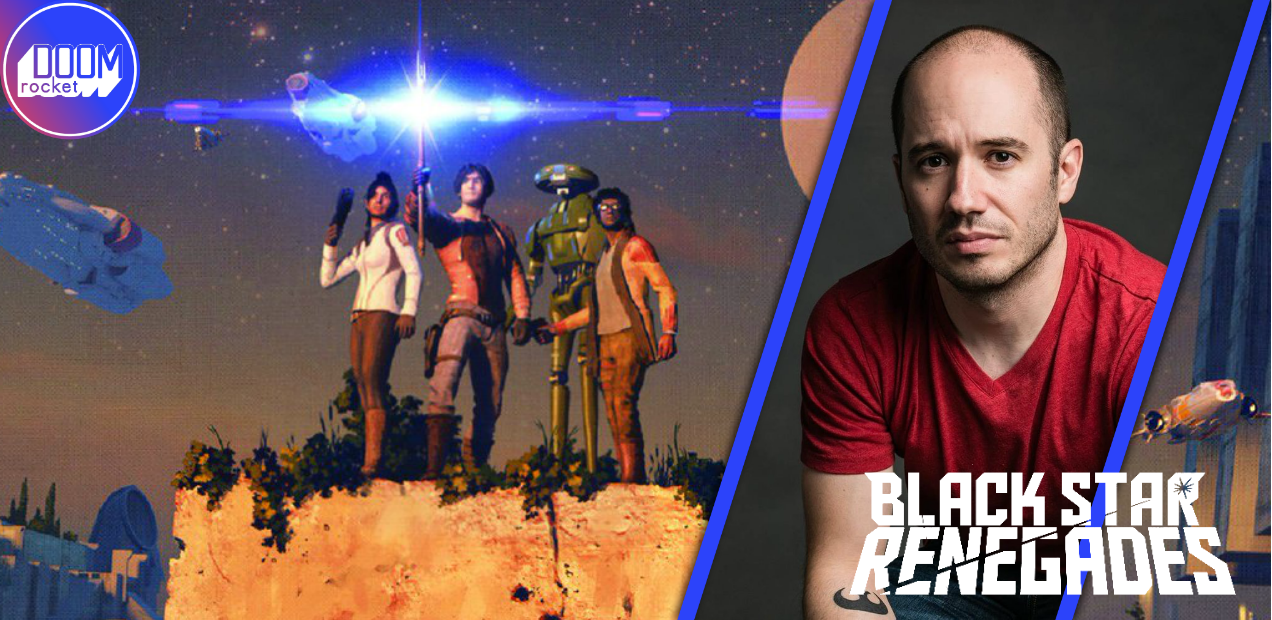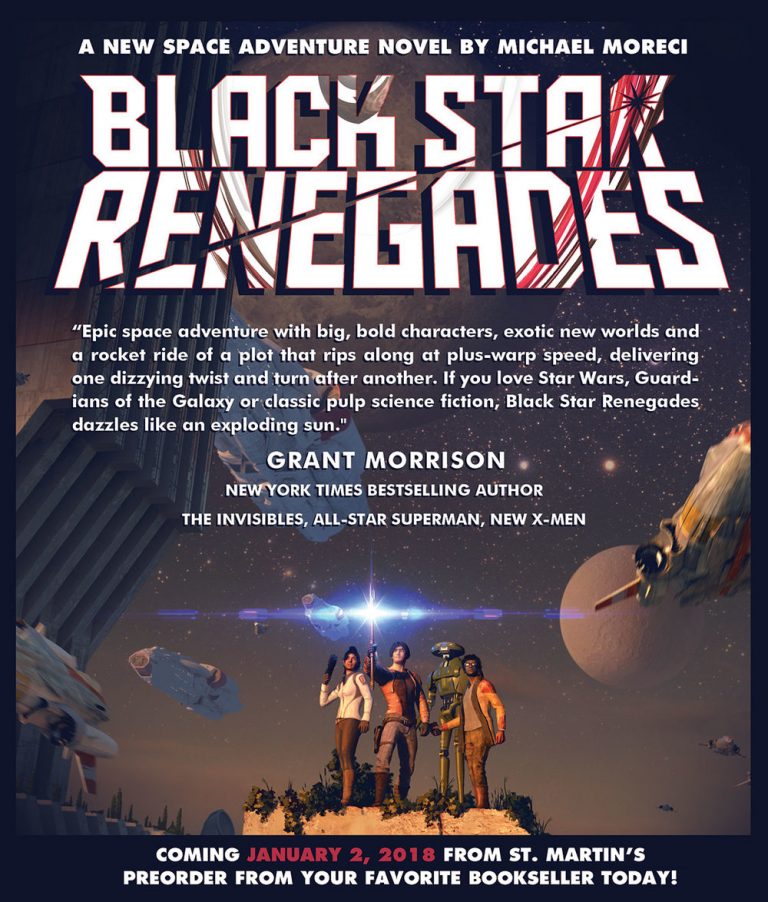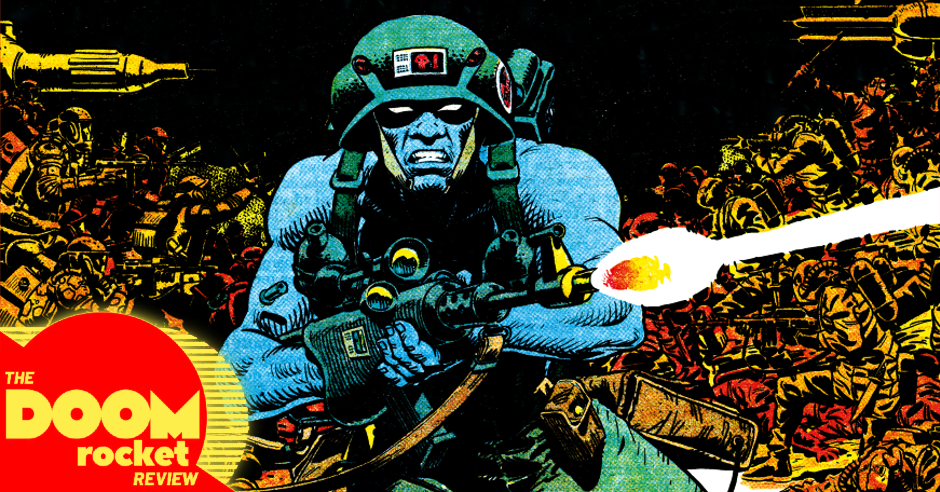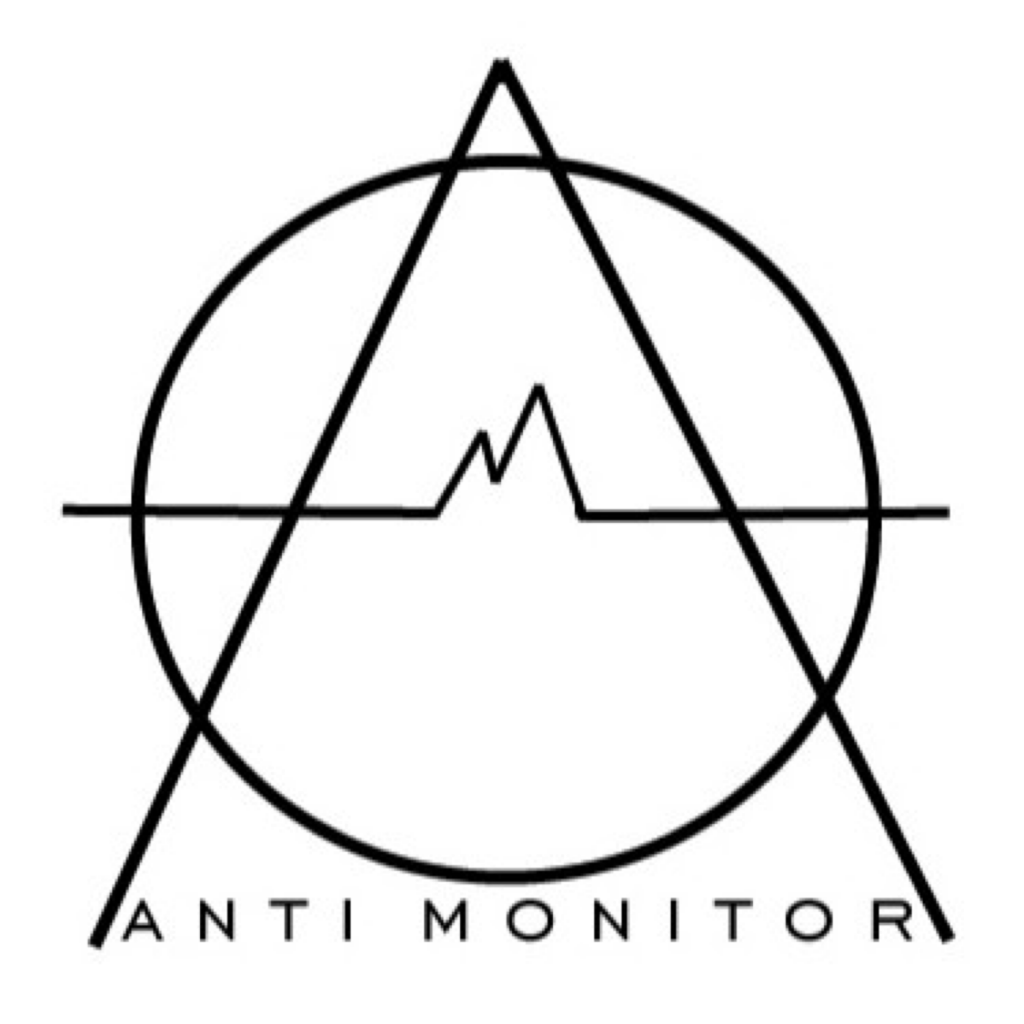By Jarrod Jones. The galaxy is in peril. Praxis, a dark force of unimaginable evil, has a firm choke-hold on every walk of life. Our protectors have cowed in their towers, waiting for a prophecy that may never come to save us all. And then there’s Cade Sura, rebel pilot and scoundrel, thrust into the center of the fray. Armed with an ancient weapon and teamed with a scrappy rogue and a snarky droid, Cade must navigate the treacherous expanses of space to strike back at Praxis… and maybe find his place in the universe.
That’s the premise of Black Star Renegades, the debut novel from Roche Limit and Superman writer Michael Moreci. And if it sounds a bit familiar, especially given the filmic climate this season, well, that’s no accident. Moreci, a fan of Star Wars since forever, tells me he wouldn’t be here today were it not for “those tales from a galaxy far, far away.”
“Star Wars, without question, has taught me more about storytelling than anything else in my life,” Moreci says. “It taught me about structure and breaking structure; it taught me that stories can be humorous but also profound, corny but also deeply emotional; it taught me about suspense and world-building and what it’s like to make characters that feel as close to your heart as anyone you know in real life.”
Enter Black Star Renegades. It’s a heartfelt love letter to Star Wars, sure, but it’s also very much its own thing. Moreci has been working in sequential art for long enough now that action and adventure is second nature to him. It’s his experience — and his enthusiasm for science fiction — that gives Renegades its propulsion. Rocketing from one jam to another, we follow Cade and his motley crew with a page-turning verve. I was thrilled by reading it, because I could tell that Michael was thrilled to have written it.
Just before Renegades reaches its much-anticipated January 2 release, I spoke with Michael Moreci about his sterling prose debut, the political and societal implications of his intergalactic parable, and what’s so vital about science fiction in general.
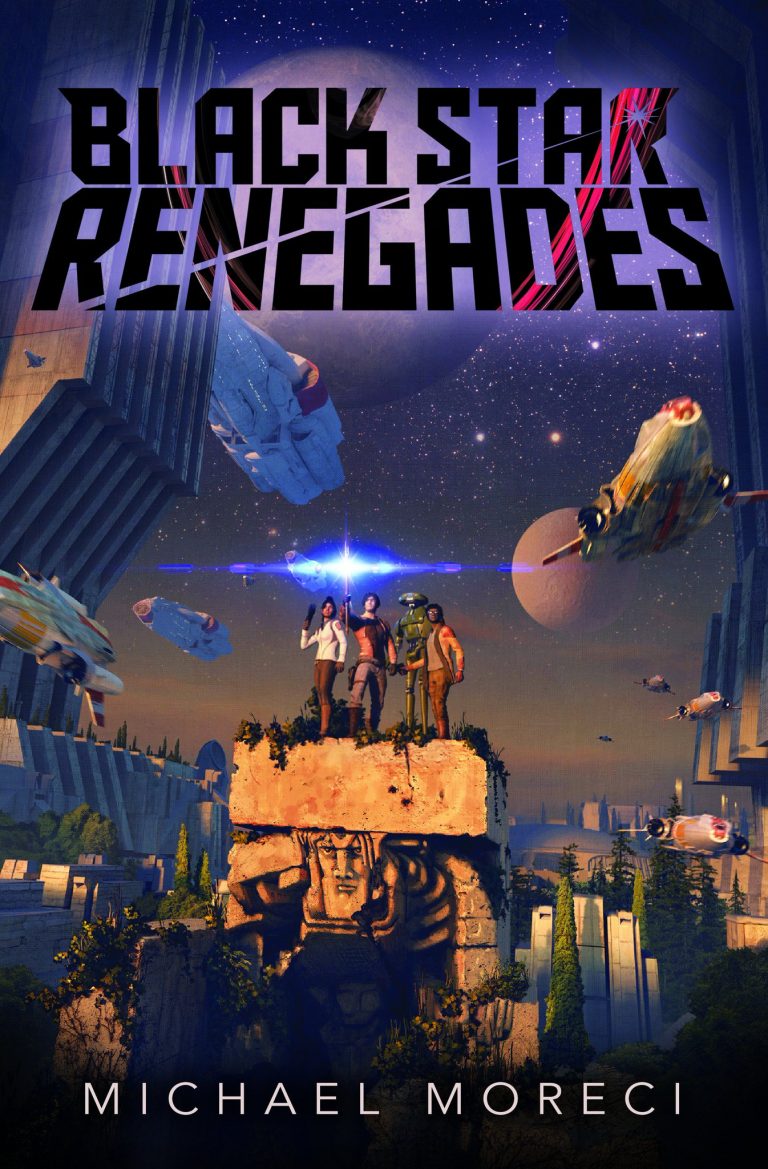
Cover to ‘Black Star Renegades’. Art by Wayne Haag. Jacket design by Lesley Worrell. Logo design by Tim Daniel/St. Martin’s Press
1. It’s no secret that you’re an unabashed Star Wars fan. Can you tell us a bit about your affinity for space operas and how they’ve guided your journey as a writer?
I’d love to!
Star Wars, without question, has taught me more about storytelling than anything else in my life. It taught me about structure and breaking structure; it taught me that stories can be humorous but also profound, corny but also deeply emotional; it taught me about suspense and world-building and what it’s like to make characters that feel as close to your heart as anyone you know in real life. And this isn’t even to mention how personal these films are to me, how much they’ve defined the person I am in more ways than I even know. And those two things—my craft as a writer and who I am as a person—come through in everything I write. I wouldn’t be here without those tales from a galaxy far, far away.
2. ‘Black Star Renegades’ tells the story of unlikely hero Cade Sura. He’s one part Han Solo, one part Peter Quill. He’s rebellious, he’s cocky, he’s what you’d imagine this archetypal reluctant hero would be. But there’s this anxiety that he struggles with. He has a serious case of “impostor syndrome.” How did you go about constructing Cade’s personality?
As they say on the internet: “it me.”
I mean, kidding aside, I suffer from the same thing Cade does, minus the swagger. I always feel like a fraud and, in some ways, a failure, and a lot of my own anxieties play out in Cade’s journey. I wanted him to be like Han, like Star-Lord, but also insecure underneath it all. His journey, after all, is—in part—about finding the power within himself, and it wouldn’t be much of a journey if he felt powerful to begin with. So, I framed him in a way that I—that many of us—understand, especially in the world we’re living in now: He feels very powerless against what he’s facing, but also a great sense of responsibility to do something about it.
3. Following on that, in ‘Renegades’, Cade’s cavalier attitude pulls a shade over his anxieties about the current state of the galaxy. He maneuvers through his story understanding there will be consequences, but there’s seems to always be a smirk on his face. How much does a character’s personality need to reflect the world that constructed around them? When do you decide to let your characters be their own people?
That’s a great question, and Cade’s attitude is definitely intentional. I wanted him to have a certain amount of levity—or have him be cavalier, which is a great way to put it—so we could balance out the dire circumstances that surround. You have a character who’s grieving a significant loss of someone he cared about, and suddenly he tasked with doing something he doesn’t want to do, nor does he feel equipped for the task. I think Cade is his own person when he’s deflecting the seriousness of his condition with humor and immaturity because he doesn’t know how else to cope with everything. Plus, some of it is just me trying to keep things in line with the tone of the book. It’s serious—what’s happening in the story—but I wanted to retain that timeless pulpy quality as well and ensure a certain amount of fun found its way into the pages.
4. In ‘Renegades’, Cade’s journey begins with the search for the book’s central plot device, the Rokura. It’s an unpredictable weapon that reacts to situations more than a tool that’s put to use. It has the ability to really shift the trajectory of Cade’s story, seemingly at will. Without giving too much away, what can you tell us about the Rokura, and the function of a proactive McGuffin?
It’s funny because I just finished book two, and the Rokura plays a way bigger role in that, and that was always my intent. But for now, it’s basically this all-powerful weapon that is fabled to have the power to bring peace to the galaxy if wielded by the Paragon. It’s Excalibur. But I wanted it to be more, because in Black Star Renegades, as much as I was out to write a love letter to Star Wars, I also wanted to subvert its tropes as well. Namely, I wanted to pick apart the messiah complex. The Rokura is a way to do that, because while Cade does wield the weapon, he’s certainly no Paragon. He’s no messiah. In light of that, well, you have to throw out any hope you had at said messiah coming around and fixing everything. But the problem—the galactic turmoil—still remains. So, Cade has to figure out Plan B and still deal with this powerful weapon that, realistically, no one person has any business wielding.
5. I wanted to talk about the action in ‘Black Star Renegades’. It’s so fluid and concise. How do you stage action in your prose? Is it blocked out separately before you put it to words? Do you act them out with Star Wars figurines? What’s your approach?
I get asked this a lot, and I’m thrilled people feel this way. I think the trick ties into my goal with writing: to express things as clearly and on as simple terms as possible. I know what I’m capable of as a writer, and crafting decorated prose is probably not in my future. I just get down to the point and try to make it read as compelling, and quickly, as possible. I want to craft page-turners; you can think about what you read later on. In the moment, I want readers to feel like they can’t put the story down for a second.
6. In the novel, the Well is a society of peacekeepers governed by warriors who have long since lost their usefulness. Cade reflects on how they, along with the Galactic Alliance, allowed the tyrannical empire known as Praxis to dominate the galaxy through their collective passivity. There’s a topicality at play here: A union of governments that can’t — or won’t — see a substantial authoritarian threat looming in their presence until it’s too late to remove it. I can’t imagine this was accidental?
Not in the least bit accidental. I’m going to deliver a hard truth (or maybe it’s not hard, I don’t know) and it’s this: The biggest flaw of my side of the political spectrum is that we’re too willing to bend, we’re too willing to negotiate, and we’re way too willing to try to see the best in people. It’s our fatal flaw, I’d say. I love Obama, I make no bones about it. But he spent far too much time trying to be a centrist. He spent far too much energy trying to get the other side to come around, assuming, like we all do, that there’s some good in them that has simply lost its way. He’s Luke and they’re Vader, right? It’s the ultimate good guy fantasy, to make evil things good. To correct their misguidedness. Except there’s no turning evil. There’s just not. Vader was evil, he did nothing but evil shit, and there’s no coming back from that. And that’s a lesson I think we’re all starting to learn. But that’s the Well. They thought things would just magically get better; they thought Praxis wouldn’t really become a tyrannical regime. And by the time they took the threat seriously (ahem, see Trump in the primaries, see Clinton’s uninspired campaigning), it was too late. They’d already lost.
7. Praxis seems to polarize the worldview of two factions that should otherwise be allies: The Rai and the Rising Sons. The former is biding their time until the Rokura prophecy is fulfilled, while the other takes a more destructive approach. Both want Praxis obliterated. Who’s in the right here — the pacifists or the anarchists?
If I had to pick—the anarchists. The Well’s mistakes, as I discussed above, are deep. And one such mistake is sitting around, waiting for a messiah to come along and save their asses. When, in reality, they could have been saving themselves. I may not agree with the Rising Sun’s methods, but at least they’re doing something to fight pack; at least they’re not passive.
8. Then there’s Kira Sen, the hard-assed pilot who displays sympathies for the Rising Sons. In the book, she’s described as so proactive and headstrong that the Well had no choice but to give her her own rogue squadron. And it’s clear, beyond her passion for justice, that her life has been tragically altered because of Praxis. How important is it to show how war affects people on a micro level? What does Kira’s character say about perpetual war?
It’s critical. It works, I think, as a nice balance to Cade’s cavalier attitude. What Kira and people like her are dealing with, it’s real. War is real and it deeply impacts people’s lives in myriad ways. Kira really knows nothing else but combat and the life of a soldier (and, man, what I’d give to write a Rogue One-esque Kira prequel story), and that has shaped her into who she is. It’s important to give life to that because it makes both her seem more real and the world all the characters inhabit seem more real.
9. Why do you feel science fiction and fantasy works so well as cautionary parables?
I think they’re essential, without question. I’m not much of a person to wear my political opinions on my sleeve via social media. I’m not comfortable with it, I’m just not. But if you read my work, you’ll know where I stand. And while I’m not critical of those who do use social media as a tool to promote their political beliefs, no amounts of tweets will ever, ever be able to match the power of fiction. Fiction can change your life (it changed mine), and I think the artistry involved in a great book, song, movie, comic, whatever, is essential to changing hearts and minds. You can scream and shout on Twitter all day long, but give someone an open mind a copy of Fahrenheit 451, The Dispossessed, Slaughterhouse-Five—magic happens.
10. You’ve said on social media that you’ve finished work on a sequel novel to ‘Black Star Renegades’. What will be the tone of this follow-up? Do you think that sequels are meant to be darker stories?
Well, I know this one is! It’s darker. Way darker. I mean, it has to be. There’s two reasons. One, there’s the simple fact that whatever actions took place in the first book/film/etc. intrinsically raised the stakes in the story. They have to, that’s a must. So now, you went from a scary world to a scarier world. In Black Star Renegades‘s case, we’re looking at a galaxy at war. And war is dark. But, also, sequels tend to be middle chapters. So if you’re looking at each chapter as an act, then part two is act two, and act two is where the protagonists hit their lowest point. And I can tell you, there’s some serious lows in the follow-up to Black Star Renegades. It retains the same humor and charm, I think, that’s a hallmark of the first book, but it gets deeper and darker as well.
‘Black Star Renegades’ is in stores January 2. You can order it here.
Before: 10 things concerning Andrew Farago and ‘The Art of Harley Quinn’

